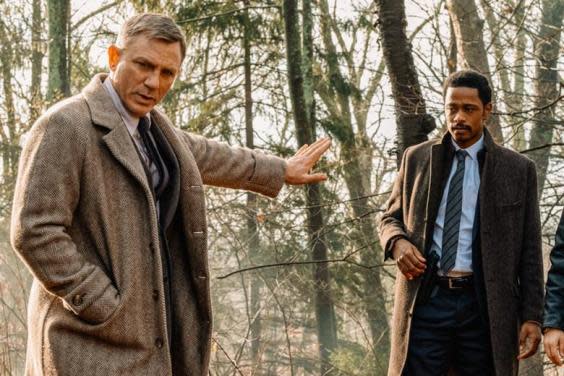No Star Wars, no Avengers: Why 2020’s sparse blockbuster calendar means this is a make-or-break year for original storytelling

Forty-five years ago, a giant mechanical shark named Bruce attacked a New England resort town, leaving not only a trail of victims in his wake, but a new type of cinema. Steven Spielberg’s Jaws was the first so-called “event movie” – a phrase coined to describe how the film had become a must-see sensation, taking a shark-size bite out of the zeitgeist and becoming an important moment in the cultural calendar. The film “recalibrated the profit potential of the Hollywood hit”, as film historian Thomas Schatz once put it, ushering in an age in which a movie could be more than just a movie: it could become a “cultural phenomenon” too, generating hundreds of millions in revenue thanks to feverish word of mouth. Ever since, there have been blockbusters, then there have been event movies: please-see films versus must-see movies, the type you’d need to live under a rock to ignore.
Last year we reached peak event movie. Avengers: Endgame drew 22 films of extravagant superhero action to an epic conclusion in April. Star Wars: The Rise of Skywalker brought the Skywalker saga full circle in December. Todd Phillips’s controversial Joker divided opinion but dominated pop-culture discourse, becoming a £1bn-grossing hit. The long-awaited Frozen 2, The Lion King remake and Toy Story 4 returned audiences to beloved worlds that had gone unvisited in years, becoming $1bn smashes themselves. These titles were massive – culminations of years (and in some cases decades) of fandom and cherished storytelling. The result was a monstrous £32.7bn spent at multiplexes around the world last year.
You’d be forgiven for thinking 2020 looks a little slight in comparison. There are big and enthralling-looking movies coming out this year: Tenet, the twisty new spy thriller from Christopher Nolan, and Bond movie No Time to Die, out in April, are both eagerly awaited. DC fans have Birds of Prey, Margot Robbie’s candy-coated Suicide Squad spin-off, and Wonder Woman 1984, out in June, to look forward to. Sony has two supervillain spectacles in the offing (Venom 2 and Jared Leto’s Morbius), while Marvel starts building its next phase of films in March with Black Widow, a long-overdue origin story for Scarlett Johannson’s ex-assassin character from the Avengers. That will be followed in November by the introduction of cosmic MCU newbies The Eternals, boasting what might be Marvel’s starriest ever cast (Angelina Jolie, Kit Harington, Richard Madden, Salma Hayek).
All of these movies could prove critical and commercial hits. The same goes for horror sequels A Quiet Place: Part II, Halloween Kills and the The Conjuring 3. But do any of them carry the same weight of expectation as a new Star Wars or Avengers outing, or even a Jurassic World movie? With the possible exception of Daniel Craig’s final turn in the 007 tux, probably not. Does buzz surround any of these imminent titles the way audiences were talking excitedly about Todd Phillips’s ultra-dark Joker this time last year? Not really. While a high proportion of these movies could prove mind-blowing pieces of entertainment that captivate audiences and exceed expectations, the way that Deadpool and Wonder Woman have in previous years, sources suggest that studio executives are not expecting 2020’s crop of blockbusters to reach the dizzying commercial heights they did in 2019.
Where does this leave the year ahead in movies? Is 2020 destined to be somewhat tame in comparison to the event-movie overload of 2019? And – whisper it – could that in fact be a good thing for the current state of cinema?
Last year was a great year for event movies, but a bad year for blockbusters. As The Independent’s Adam White noted last month, there was a time when £100m budget extravaganzas such as Dark Phoenix, Godzilla: King of the Monsters and The Lego Movie 2 were “a sure thing – comfortably dependable properties that could be dressed up with a new lick of paint or a couple of new faces and cinemagoers would flock to them regardless. But their widespread rejection spoke to a tricky new status quo for Hollywood, where successful movies don’t guarantee equally successful sequels, stars aren’t enough to woo punters, and almost everything that is popular is also transient.” The disappointing box-office returns on releases like Men in Black: International, Terminator: Dark Fate, Bumblebee, Hellboy and Charlie’s Angels, in a time of streaming services and prestige television offering entertainment at home, underlined how brand recognition and big-name stars were no longer enough to lure people out of the house. Movies now must have high-stakes, meme-generating, agenda-setting cultural talking points to stand any chance of getting viewers out in great numbers.
Olivia Wilde’s critically acclaimed but commercially underwhelming Booksmart was a perfect example of this new paradigm. “It had great reviews but audiences didn’t feel like they had to see it at the cinema,” says BBC Radio 1 film critic Ali Plumb. “Prices are going up. People are strapped for cash. There was a sense I think that they could wait and watch it at home, which they couldn’t do with something like Endgame.”

Hollywood’s response to the rise of services like Netflix and Amazon Prime Video, not to mention the launch of additional services from Disney, HBO and Apple, all offering big-budget original content, has been to amp up the number of films positioned as event movies. “The way Rise of Skywalker was marketed was so telling,” says one source, who asked to remain anonymous. “After [2018 Star Wars standalone movie] Solo bombed at the box office, every single piece of advertising for this one made a ton of noise about it being the final chapter in the Skywalker saga – the conclusion of a 40-year-old story. They weren’t confident enough in the Star Wars brand name anymore to just trust audiences would want to return to that universe, those characters – their marketing raised the stakes even further. It wasn’t marketed as just another episode, it had to be bigger than that.”
Now, Hollywood has come to the end of cycles of some of these reliable event-movie brands, with many studios hitting the reset button on franchises in 2020. Star Wars will take a break from cinemas, with plans for future films yet to be firmed up. After the deaths of beloved characters, and the conclusion of contracts with some of its A-list stars, the Marvel Cinematic Universe will ring in the new decade by introducing new characters, with The Eternals, Shang-Chi and Blade incoming. Next year is a bit more business as usual as far as event movies are concerned: The Matrix 4, Jurassic World 3, Avatar 2 and Matt Reeves’s The Batman are just some of the heavy hitters destined to challenge the box office records set in 2019. In the meantime, 2020 looks like a bit of a fallow year.
There could be an advantage to this. In 1999, 17 of the 25 top-grossing movies of the year at the US box office were based on original concepts and characters, rather than existing franchises. By 2009, that number had been slashed to 11. Looking at 2019’s box office figures, you have to scroll all the way down to 12th to find a film that’s neither a sequel, an adaptation nor a reboot (Jordan Peele’s Us). Of the 25 top-grossing movies in America last year, only Us, Once Upon a Time in Hollywood and Knives Out could be classified as original. “It’s a terrible time to try and get an original idea made into a movie,” one well known director recently complained to me, off the record.

The relative lack of event movies this year offers a chance to rectify that. “I think there’s more original storytelling on offer this year,” says Louise Tutt, deputy editor of trade publications Screen International and Screen Daily. “To produce and make a film is expensive, and distributors need to spend at least the same amount again on marketing and distribution. Add to this how hard it is now to get audiences into cinemas to watch films other than the big event movies, due to the boom in high-end television and platforms such as YouTube and TikTok among younger audiences, and it’s obvious why the commercial side of the industry is always going to opt for the known quantities as better business opportunities.” Cinemas follow this philosophy too: why schedule a showing of Uncut Gems on a screen that could be showing Star Wars? In years full of event movies, it’s harder for the decreasing number of smaller, original movies that are being created, to be seen.
With fewer event movies crowding out cinemas and cultural conversation, is there an opportunity for more original movies to shine in 2020? “Yes, in theory,” says Tutt. “I have high hopes for [Bong Joon-ho’s acclaimed drama] Parasite, especially if it can win a Bafta or an Oscar or two, as I suspect it might.” She adds that, “in terms of original IP [intellectual propety], there’s none bigger than Christopher Nolan’s Tenet, coming from Warner Bros. I expect this will be huge.”
Radio 1’s Plumb is a bit more cautious. “There are so many factors that determine if a movie becomes a hit,” he explains. “Is the movie high quality? Is there intrigue around it? Does it have a gimmick? Is a guaranteed seat-filling star in it? There’s also a good amount of luck required. Is it released on a rainy weekend, in which people are happy to sit inside a cinema and watch a film? Is it released on such a rainy weekend that no one wants to leave the house?” These factors don’t disappear simply because of the absence of event movies. A movie like Booksmart wouldn’t necessarily be a success if it was released in 2020, instead of having gone up against Disney’s live-action Aladdin last year. One thing seems certain though: if more original movies were to prove successful this year, more would be commissioned. A cinematic landscape with more Knives Outs amid all the superhero sequels can only be a healthy thing.
Perhaps this year will see original movies strike back. Movies like Edgar Wright’s Last Night In Soho, Wes Anderson’s The French Dispatch and Kelly Reichardt’s First Cow are unlikely to take the place of event films, but with more room in cinemas and in discourse to flourish, they may just land with more impact, proving to Hollywood’s top dogs that there’s still an appetite for original narratives as well as franchise spectacles. Or perhaps audiences will stay away, causing Hollywood to double down on its current emphasis on event movies, and we’ll eventually come full circle. A rebooted Jaws Cinematic Universe anyone? Don’t rule it out.
Read more
New Star Wars film already in the works
Parasite shows the master-servant relationship is very much alive
Devil’s in the detail: Why is the film industry so afraid of horror?

 Yahoo News
Yahoo News 